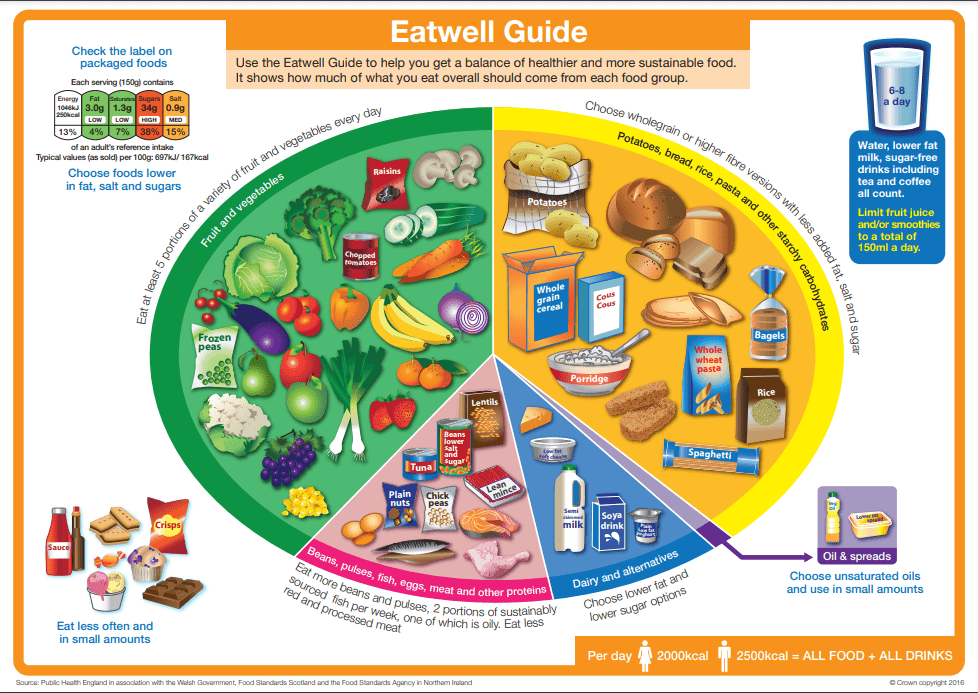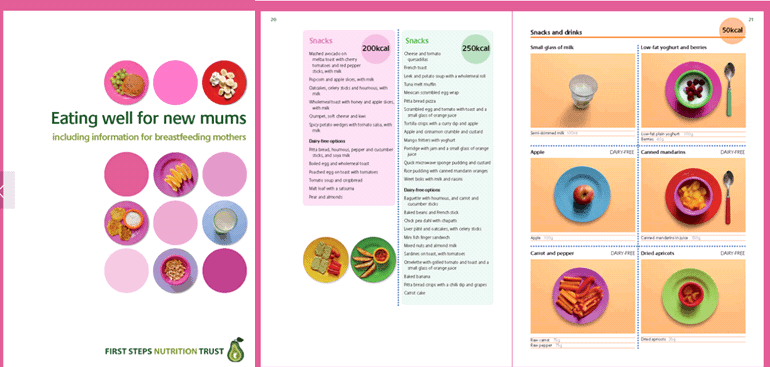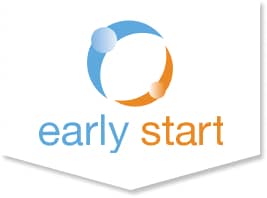Congratulations on becoming a mum!
No doubt you’ll be adapting to a new way of life and routine with your new arrival. While you’ll be busy trying to meet your baby’s needs, it’s essential that you continue to look after yourself. This can be a little easier said than done, as a new baby requires a lot of time and attention, meaning regular meals and eating well as a new mum can fall by the wayside (especially if you’re feeling really tired!).
The good news is, you don’t need to be following a special diet, just the same general healthy eating principles as normal.
The UK EatWell Guide (opens in new tab) is a fantastic tool to help make sure you’re eating well as a new mum!
Plan meals and snacks to include:
- Plenty of starchy foods, especially wholegrain varieties
- Plenty of fruits and vegetables (aim for at least 5 portions a-day!)
- Moderate amounts of protein foods, along with aiming for meat free days and including two portions of fish
- Moderate amounts of dairy and alternative foods- aiming to choose low fat varieties
- Some unsaturated fats, such as avocados, nuts, oily fish and seeds.
Eat less:
- Foods high in saturated fats, such as fried foods, pastry, biscuits, pies and cakes
- Sugary food and drink, such as sweets, biscuits, cakes and fizzy drinks.

Eating Well as a New Mum- Here are a few tips to help you in those first weeks:
- Try to have nutritious foods easily to hand- e.g. chopped fruit and vegetables, yoghurts, wholegrain bread and crackers
- Keep meals simple and avoid recipes with lengthy preparation and cooking times (unless of course you enjoy this)
- It can be hard to find time to cook everyday, so you might find batch cooking and freezing meals is helpful during the week for quick go-to meals!
- If friends and family plan to visit, you could ask them to kindly bring ingredients, or, even better, some home cooked meals for you
- If people are helping you to do a food shop or buy groceries, provide them with a list
- If you’re finding it hard to get out of the house, try: booking an online food delivery slot, buying a surplus fruit and vegetable box, arrange for milk deliveries, etc.

Breastfeeding
Many women wonder if breastfeeding their baby means they have to follow a special diet. The good news is, other than a few considerations and needing to avoid/limit a few foods, you can safely enjoy a balanced diet.
Do I need to eat more if I’m breastfeeding?
- If you exclusively breastfeed your baby in the first 6 months, it’s thought to use around 300 calories a day
- Some women report feeling hungrier when they breastfeed, while others don’t feel as though their appetite changes
- Be guided by your hungry. So unless you feel hungrier, there’s no need to try and eat extra food.

Do I Need to Drink More When Breastfeeding?
When you body produces breast milk it uses extra fluid, so it’s normal to feel thirstier than usual.
Here in the UK there are no set recommendations around the amount of extra fluid that you need, as this really depends on the weather, your activity levels and the foods that you eat (a lot of our fluid intake comes from the food we have).
Be guided by your thirst, and continue to have sips of water throughout the day to help keep you well hydrated. It’s also a good idea to have a glass of water or a water bottle at hand when you give your baby a feed.

Calcium Requirements when Breastfeeding
As your baby’s need for calcium increases, your body will adapt so that they get more calcium through your breast milk. Your body does this by increasing the amount of calcium it can absorb, along with drawing some of the calcium from your bones.
The average adult needs around 700 milligrams of calcium a day, while a breastfeeding mother needs around 1250 milligrams. During this time, it’s important that you try to increase the amount of calcium in your diet, as this will help to protect your bones.
The British Dietetic Association recommend that to meet this calcium demand, that you try to have around 5 servings of calcium rich foods, such as dairy products, each day. They’ve also produced a really useful guide showing how much calcium is provided in different foods. (opens in new tab)

If you don’t include dairy products in your diet, it’s important to include other calcium containing foods, such as:
- Calcium fortified milk alternatives
- Dark green, leafy vegetables, such as broccoli, collard greens, and bok choy
- Canned sardines and salmon with bones
- Tofu, almonds, and corn tortillas
- Foods fortified with calcium, such as orange juice, cereals, and breads

Are There Any Foods I Need to Limit if I’m Breastfeeding?
Caffeine
- Limit your intake to no more than 200 milligrams a day
- Caffeine is a stimulant and it can pass through your breast milk and unsettle your baby and disrupt their sleep
- To help you stay within this recommendation, you could include decaffeinated teas and coffees.
Alcohol
- When you’re breastfeeding, the safest approach is to avoid drinking alcohol
- While the occasional drink is unlikely to harm your breastfed baby, if you choose to consume alcohol, it’s recommended that you have no more than 1 or 2 units once or twice a week
- If you’d like more information on alcohol and breastfeeding, visit the Start4Life website here (opens in new tab).
Fish
- It’s also recommended that you have no more than:
- one portion of either swordfish, marlin and shark each week due to their high levels of mercury
- two portions of oily fish each week as they contains pollutants.

Eating Well as a New Mum- for more information and advice:
Sign up to our e-guide here! (opens in new tab)
Visit the NHS website for more information on breastfeeding and your diet (opens in new tab)
Check out First Steps Nutrition’s recipe book for new mums (opens in new tab)

It may be a little way off, but as your baby approaches the age of 6 months you’ll start to think about introducing them to solid foods. Check out these free resources:
E-Guide- Feeding your Baby in the First Years (opens in new tab)
This interactive guide has been created for families who are about to begin their baby’s exciting food journey! It can be confusing knowing when and how to start introducing your baby to solid foods, so this guide will help to answer questions such as when to start, what foods to offer and how much is enough. You’ll also find lots of helpful resources, such as recipes, videos and tip sheets, to help you give your baby the best start in life.
Webinar- Weaning your Baby (opens in new tab)
This 45 minute webinar helps to support parents on their weaning journey. Our registered nutritionists will cover the following topics to build your confidence when feeding your baby: what foods to offer, mealtime routine, food textures, how to support your baby at mealtimes and drinks for your baby with advice on introducing a cup. There will also be an opportunity to ask any questions you have!



[…] is equally important, with regular meals and snacks being essential for new mothers. The Early Start Group emphasizes the need for a balanced diet, including a good intake of calcium-rich foods to support […]